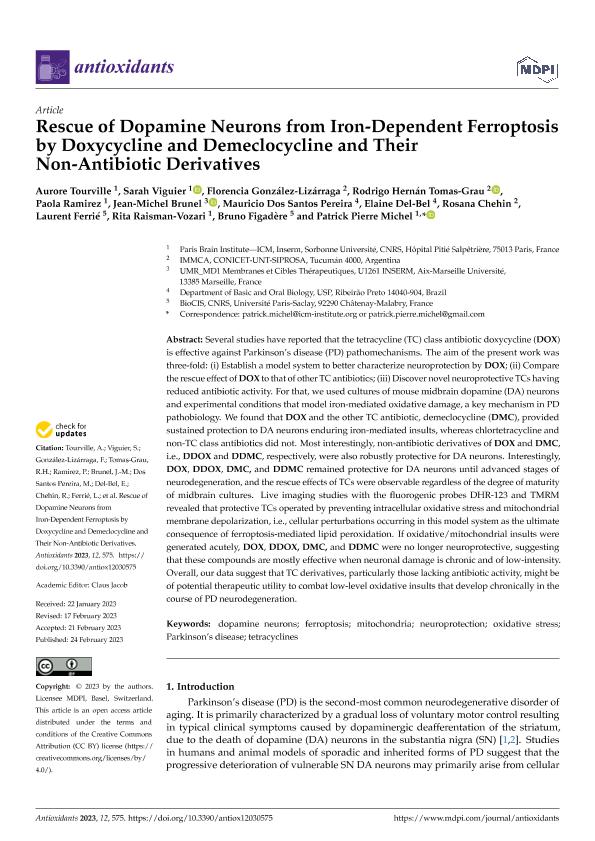Artículo
Rescue of Dopamine Neurons from Iron-Dependent Ferroptosis by Doxycycline and Demeclocycline and Their Non-Antibiotic Derivatives
Tourville, Aurore; Viguier, Sarah; González Lizarraga, Maria Florencia ; Tomas Grau, Rodrigo Hernán
; Tomas Grau, Rodrigo Hernán ; Ramirez, Paola; Brunel, Jean Michel; Dos Santos Pereira, Mauricio; Del Bel, Elaine; Chehin, Rosana Nieves
; Ramirez, Paola; Brunel, Jean Michel; Dos Santos Pereira, Mauricio; Del Bel, Elaine; Chehin, Rosana Nieves ; Ferrié, Laurent; Raisman Vozari, Rita; Figadère, Bruno; Michel, Patrick Pierre
; Ferrié, Laurent; Raisman Vozari, Rita; Figadère, Bruno; Michel, Patrick Pierre
 ; Tomas Grau, Rodrigo Hernán
; Tomas Grau, Rodrigo Hernán ; Ramirez, Paola; Brunel, Jean Michel; Dos Santos Pereira, Mauricio; Del Bel, Elaine; Chehin, Rosana Nieves
; Ramirez, Paola; Brunel, Jean Michel; Dos Santos Pereira, Mauricio; Del Bel, Elaine; Chehin, Rosana Nieves ; Ferrié, Laurent; Raisman Vozari, Rita; Figadère, Bruno; Michel, Patrick Pierre
; Ferrié, Laurent; Raisman Vozari, Rita; Figadère, Bruno; Michel, Patrick Pierre
Fecha de publicación:
02/2023
Editorial:
MDPI
Revista:
Antioxidants
ISSN:
2076-3921
Idioma:
Inglés
Tipo de recurso:
Artículo publicado
Clasificación temática:
Resumen
Several studies have reported that the tetracycline (TC) class antibiotic doxycycline (DOX) is effective against Parkinson?s disease (PD) pathomechanisms. The aim of the present work was three-fold: (i) Establish a model system to better characterize neuroprotection by DOX; (ii) Compare the rescue effect of DOX to that of other TC antibiotics; (iii) Discover novel neuroprotective TCs having reduced antibiotic activity. For that, we used cultures of mouse midbrain dopamine (DA) neurons and experimental conditions that model iron-mediated oxidative damage, a key mechanism in PD pathobiology. We found that DOX and the other TC antibiotic, demeclocycline (DMC), provided sustained protection to DA neurons enduring iron-mediated insults, whereas chlortetracycline and non-TC class antibiotics did not. Most interestingly, non-antibiotic derivatives of DOX and DMC, i.e., DDOX and DDMC, respectively, were also robustly protective for DA neurons. Interestingly, DOX, DDOX, DMC, and DDMC remained protective for DA neurons until advanced stages of neurodegeneration, and the rescue effects of TCs were observable regardless of the degree of maturity of midbrain cultures. Live imaging studies with the fluorogenic probes DHR-123 and TMRM revealed that protective TCs operated by preventing intracellular oxidative stress and mitochondrial membrane depolarization, i.e., cellular perturbations occurring in this model system as the ultimate consequence of ferroptosis-mediated lipid peroxidation. If oxidative/mitochondrial insults were generated acutely, DOX, DDOX, DMC, and DDMC were no longer neuroprotective, suggesting that these compounds are mostly effective when neuronal damage is chronic and of low-intensity. Overall, our data suggest that TC derivatives, particularly those lacking antibiotic activity, might be of potential therapeutic utility to combat low-level oxidative insults that develop chronically in the course of PD neurodegeneration.
Palabras clave:
DOPAMINE NEURONS
,
PARKINSON'S DISEASE
,
FERROPTOSIS
,
TETRACYCLINES
Archivos asociados
Licencia
Identificadores
Colecciones
Articulos (IMMCA)
Articulos de INSTITUTO DE INVESTIGACIONES EN MEDICINA MOLECULAR Y CELULAR APLICADA DEL BICENTENARIO
Articulos de INSTITUTO DE INVESTIGACIONES EN MEDICINA MOLECULAR Y CELULAR APLICADA DEL BICENTENARIO
Citación
Tourville, Aurore; Viguier, Sarah; González Lizarraga, Maria Florencia; Tomas Grau, Rodrigo Hernán; Ramirez, Paola; et al.; Rescue of Dopamine Neurons from Iron-Dependent Ferroptosis by Doxycycline and Demeclocycline and Their Non-Antibiotic Derivatives; MDPI; Antioxidants; 12; 3; 2-2023; 1-23
Compartir
Altmétricas



